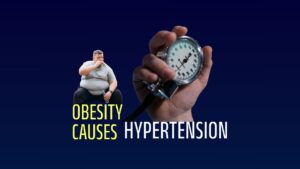
Vidhi Dave
Bariatric Dietician & Content Writer

Stress vs. the Waistline: How Stress Contributes to Obesity

Stress has become a normal part of our lives in today’s fast-paced and demanding environment. Stress can appear in a variety of ways and have a negative impact on our whole well-being, including our physical health. Obesity is a prominent effect of chronic stress. While the link between stress and obesity is complicated.
Link between stress and cortisol : Long job hours, lack of sleep, marital troubles, financial concerns, and a poor diet are all ongoing stressors in your life. The truth is that our modern lifestyles are stressful, and your body was not built to be constantly in fight or flight mode.
When you are stressed, your adrenal glands release adrenaline and cortisol, which causes glucose (your major source of energy) to be released into your bloodstream. Cortisol raises your appetite, causes insulin resistance, and slows your metabolism as it circulates through your bloodstream. This causes the body to store fat and calories in order to help you deal with stress.
Cortisol production causes craves for meals that provide a rapid energy source, such as a simple carbohydrate. Simple carbohydrates, or sugar, enter the bloodstream quickly and increase blood glucose levels for a short burst of energy.
In addition to the hormonal changes caused by stress, stress can cause you to engage in the following unhealthy habits, all of which can lead to weight gain:
Emotional eating: Elevated cortisol levels might not only make you crave unhealthy foods, but they can also cause you to eat more than you normally would. Snacking or reaching for a second helping may provide short relief from stress, but it makes good weight management more challenging.
Consuming “accessible” or “fast food”: We tend to consume the first thing we see and/or what is readily available and accessible when we are stressed, which is not usually the healthiest option. You are also more likely to drive through a fast-food restaurant rather than invest the time and mental energy in preparing a balanced, healthful dinner.
Sedentary Lifestyles: With so many demands on your daily schedule, exercising may be one of the last things on your list. Excessive screen time, prolonged sitting, and decreased physical exercise all contribute to a sedentary lifestyle. Obesity and weight gain become worse by a lack of physical activity. Furthermore, stress can reduce our enthusiasm and energy levels, making regular exercise more difficult. Stress-induced sedentary behaviour combined with decreased physical activity might lead to weight gain and obstruct weight loss efforts.
Skipping meals: When you’re balancing multiple tasks at once, eating a healthy meal may go to the bottom of your priority list. You might skip breakfast because you’re rushing late, or you might skip lunch because you have too much on your to-do list.
Sleep Deprived: When people are worried, they often have difficulties sleeping. In addition, sleep deprivation has been associated with a slower metabolism. Overtiredness can also impair concentration and lead to unhealthy eating habits.
Science-Backed Strategies for Avoiding Stress-Induced Weight Gain
Set your priorities: For a week, keep track of how you spend your time. Remember to make time in your schedule for proper sleep and exercise.Aim for 7-9 hours of excellent sleep per night to improve physical and mental health, control appetite hormones, and lower the risk of stress-related weight gain.
Meditate: Meditation and mindfulness are appropriate ways to handle stress. Meditating allows your mind to alleviate tension and generate sensations of calmness, attention, and balance.
Yoga: Yoga focuses on breathing exercises and attentive movement. Your body and mind will become more in tune as a result. Regular exercise helps relieve tension and anxiety.
Regular Exercise: Exercise not only reduces stress but also can directly affect weight by increasing lean muscle mass and helping with calorie burning, which aids in losing weight.Additionally, engaging in regular physical activity can increase endorphin production. These are substances in the brain that can improve mood and make you feel relaxed.
Consuming Healthy Food: Your nutrition is crucial when it comes to managing stress. Your body receives the energy and nutrition it needs from food. The proper balance of nutrients can be provided through a diet high in whole, nutrient-dense foods. Nutrient-rich meals are minimally processed, free of added sugars, and naturally rich in vitamins, minerals, vital fatty acids, and other nutrients.
Among them are the following:
Fruits and vegetables that are colourful
Whole grains
Seafood and fish
Legumes
Nuts and seeds
Unprocessed lean meats or soy products
Effective stress management is essential for preventing and fighting obesity. People can actively reduce stress levels and lead healthier lives by adopting regular physical activity, engaging in mindfulness and relaxation exercises, eating a balanced diet, and giving enough sleep first priority. Always keep in mind that obtaining and maintaining general well-being requires effective stress management.
Our dedication to our patients at Aastha Bariatric extends beyond the surgery. We are aware that achieving a healthy weight involves not only physical changes but also improvements in mental health. So, throughout their journey, we give our patients’ mental health top priority and make sure their problems are being heard.






